
Lee "Scratch" Perry was a Jamaican record producer, composer and singer noted for his innovative studio techniques and production style. Perry was a pioneer in the 1970s development of dub music with his early adoption of remixing and studio effects to create new instrumental or vocal versions of existing reggae tracks. He worked with and produced for a wide variety of artists, including Bob Marley and the Wailers, Junior Murvin, The Congos, Max Romeo, Adrian Sherwood, Beastie Boys, Ari Up, The Clash, The Orb, and many others.
Studio One is one of Jamaica's most renowned record labels and recording studios; it has been described as the Motown of Jamaica. The record label was involved with most of the major music movements in Jamaica during the 1960s and 1970s, including ska, rocksteady, reggae, dub and dancehall.

Slow Train Coming is the 19th studio album by American singer-songwriter Bob Dylan, released on August 20, 1979, by Columbia Records. It was Dylan's first album following his conversion to Christianity, and the songs either express personal faith, or stress the importance of Christian teachings and philosophy. The evangelical nature of the record alienated many of Dylan's existing fans; at the same time, many Christians were drawn into his fan base. Slow Train Coming was listed at No. 16 in the 2001 book CCM Presents: The 100 Greatest Albums in Christian Music.

Bob Marley and the Wailers were a Jamaican ska, rocksteady and reggae band. The founding members, in 1963, were Bob Marley, Peter Tosh, and Bunny Wailer.

Self Portrait is the tenth studio album by American singer-songwriter Bob Dylan, released on June 8, 1970, by Columbia Records.
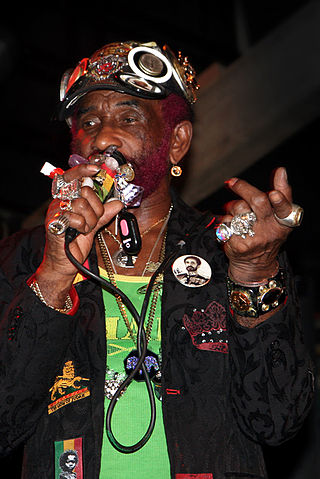
The Upsetters was the name given to the house band for Jamaican reggae producer Lee "Scratch" Perry. The name of the band comes from Perry's nickname of Upsetter, after his song "I Am the Upsetter", a musical dismissal of his former boss Coxsone Dodd.

Soul Rebels is the second studio album by the Wailers, their first album to be released outside Jamaica. The Wailers approached producer Lee "Scratch" Perry in August 1970 to record an entire album, and the sessions took place at Randy's recording studio above Randy's Record Mart at 17 North Parade in Kingston, Jamaica, until November. First issued in the UK by Trojan Records in December 1970, the album has since been re-released several times on several different labels. Perry's production is sparse and haunting, only featuring guitar, bass, drums, electronic organs, and vocals with no horns or other embellishments.
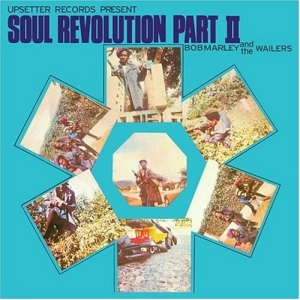
Soul Revolution Part II is the third album by Bob Marley and the Wailers. It was produced by Lee "Scratch" Perry. While the name on the album cover for all the original releases was Soul Revolution Part II, some releases had the name Soul Revolution printed on the album label, leading to uncertainty over what name was intended. A "dub" version with the vocals removed was released as Soul Revolution Part II Dub; both versions were released as one set in 1988. The album was repackaged with additional material as African Herbsman in 1973.
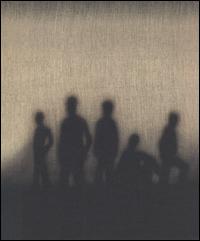
A Musical History is the second box set to anthologize Canadian-American rock group the Band. Released by Capitol Records on September 27, 2005, it features 111 tracks spread over five compact discs and one DVD. Roughly spanning the group's journey from 1961 to 1977, from their days behind Ronnie Hawkins and Bob Dylan through the departure of Robbie Robertson and the first disbanding of the group. The set includes highlights from each of the group's first seven studio albums and both major live recordings and nearly forty rare or previously unreleased performances.
"Police and Thieves" is a reggae song first recorded by the falsetto singer Junior Murvin in 1976. It was covered by the punk band The Clash and included on their self-titled debut album released in 1977.

Leroy Sibbles is a Jamaican reggae musician and producer. He was the lead singer for The Heptones in the 1960s and 1970s.
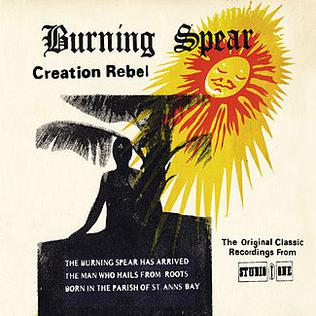
Creation Rebel is a 2004 compilation album by reggae artist Burning Spear.
The Heptones are a Jamaican rocksteady and reggae vocal trio most active in the 1960s and early 1970s. They were one of the more significant trios of that era, and played a major role in the gradual transition between ska and rocksteady into reggae with their three-part harmonies. The Heptones were contemporaries of the Wailers and the Maytals, and every bit their equal in the mid-1960s.

Earl "Chinna" Smith, a.k.a. Earl Flute and Melchezidek the High Priest, is a Jamaican guitarist active since the late 1960s. He is most well known for his work with the Soul Syndicate band and as guitarist for Bob Marley & the Wailers, among others, and has recorded with many reggae artists, appearing on more than 500 albums.

Thanks I'll Eat It Here is the only solo album by rock and roll singer-songwriter Lowell George. While George is best known for his work with Little Feat, by 1977 Lowell felt that they were moving increasingly into jazz-rock, a form in which he felt little interest. As a result, he began working on his own album. Thanks I'll Eat It Here is an eclectic mix of styles reminiscent of Little Feat's earlier albums – in particular Dixie Chicken, on which the track "Two Trains" originally appeared. The album was released just before the death of Lowell George in 1979 and has cover art by Neon Park containing several pop-/cult references including a picnic scene, mirroring Édouard Manet's Le déjeuner sur l'herbe, which shows Bob Dylan, Fidel Castro and Marlene Dietrich as Der Blaue Engel with an open copy of Howl beside them.
"I Shall Be Released" is a 1967 song written by Bob Dylan.

War Ina Babylon is an album by Max Romeo and Lee Perry's backing band The Upsetters, released in 1976.
Police and Thieves is an album by Junior Murvin and backing band The Upsetters, released in 1977. Along with The Heptones' Party Time and Max Romeo's War Ina Babylon, this album is considered part of a Black Ark Lee 'Scratch' Perry-produced "holy trinity".
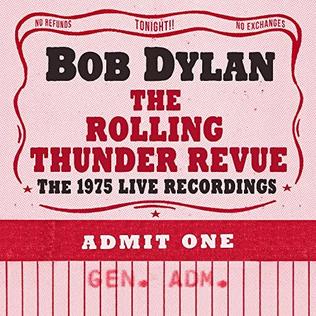
Bob Dylan – The Rolling Thunder Revue: The 1975 Live Recordings is a box set of 1975 live recordings by Bob Dylan, released on June 7, 2019. For this tour, Dylan assembled a loose collective of a backing band called Guam and played across North America for several dozen shows. The tie-in Netflix documentary film Rolling Thunder Revue: A Bob Dylan Story by Martin Scorsese was released the following week. A similar compilation was released in 2002 entitled Bob Dylan Live 1975, The Rolling Thunder Revue, as part of Dylan's ongoing Bootleg Series. That compilation was re-released on vinyl as a companion to the later release.

"One More Cup of Coffee (Valley Below)" is a song by American singer-songwriter Bob Dylan, which was released as the fourth track on his seventeenth studio album Desire (1976). The song was written by Dylan, and produced by Don DeVito. The album version of "One More Cup of Coffee (Valley Below)" was recorded on July 30, 1975, and released on Desire in January 1976. Dylan said the song was influenced by his visit to a gypsy celebration at Saintes-Maries-de-la-Mer in France on his 34th birthday.














